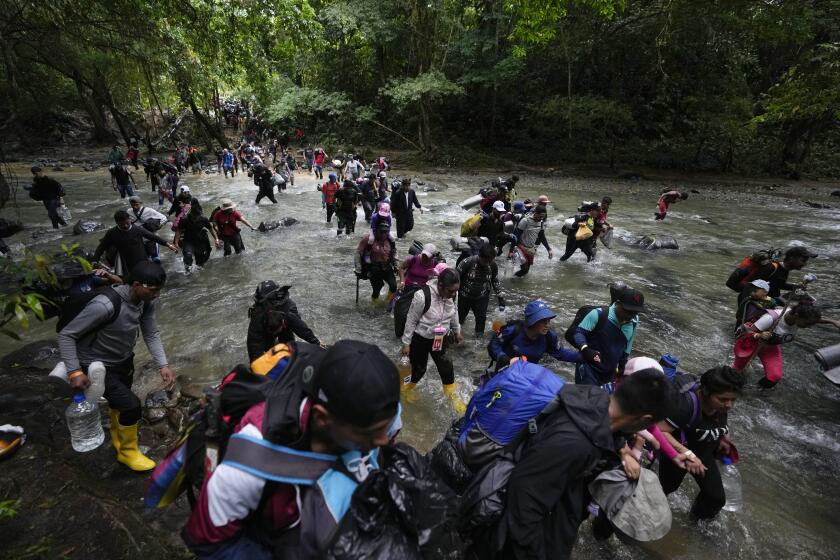Lessons in Safety South of the Border Imitate Life
It was a sobering sampler of possible perils for executives working on the Mexican side of the border.
Simulated carjackings, ATM holdups and street muggings--those and lots of stern talk formed a one-day crime curriculum Saturday for three dozen managers of Japanese firms with factories in crime-troubled Tijuana.
The instructors were off-duty San Diego police officers. They offered a morning lecture on crime awareness, then played the role of gun-toting attackers during a series of jarring enactments meant to teach the Japanese executives how to survive the kind of street violence seen in Tijuana.
The city contains more than 800 foreign-owned assembly plants known as maquiladoras.
A Mini-Camp of Crime
The San Diego offices of Sanyo, which builds televisions south of the border, were turned into a mini-camp of crime. An outdoor passage was the setting for staged muggings, with participants--wearing protective vests--getting jumped by an attacker armed with a paint-ball gun.
Elsewhere, officers with paint guns surprised class members as they pretended to withdraw money from an automated teller.
The parking lot echoed with shouts--and the pop-pop of a starter pistol--as officers posing as carjackers pulled off realistic attacks on students assigned to circle the lot in a sedan. The instructors then told students what they had done right and wrong.
The goal was to teach them to survive, through compliance or escape, if possible. Those who acted too slowly were “shot” during the assaults.
“This is the international sign of violence,” said Det. Jose Cuervo, waving his starter pistol after a carjacking simulation. He had just “shot” Masashi Ogata, a production manager for Canon Business Machines, who jumped from the car as ordered but didn’t understand commands in English to get down on the ground.
The police trainers urged the students, many of whom spoke halting English and almost no Spanish, to react to tone of voice and body language.
“We’re not going to have trilingual criminals out there,” Cuervo said.
Focus Is on Mundane Threats
The safety training, sponsored by the National Latino Peace Officers Assn., included a brief section on terrorism concerns, but centered mainly on the threat of mundane crime that can confront scores of managers who live on the U.S. side and commute daily to Tijuana.
Japanese electronics companies, such as Sanyo and Sony, operate some of the biggest and most prominent of the border factories. Though attacks on Japanese managers are not common, executives have been keenly concerned with security since two highly publicized incidents in recent years.
In 1996, Mamoru Konno, president of Sanyo Video Components, was kidnapped after a company outing in Tijuana. He was freed unharmed after his captors were paid $2 million. In 1999, a manager for another Japanese firm was killed at a stoplight in Tijuana’s industrial zone during an apparent carjacking.
Japanese Were Frightened
Those attacks shocked and frightened Japanese employees unused to such violence at home. Representatives of Japanese firms asked San Diego police for guidance. The result was sporadic training sessions for the Japanese Maquiladora Assn., with 71 member companies.
“I was thinking maybe the United States was much worse as a security matter--so many criminals with guns,” said Joji Hiraiwa, a Canon planning manager who has worked at the border since the 1970s. “But year by year, the situation in Tijuana is getting worse.”
Worse Crime Rate Feared
Hiraiwa lives in Chula Vista and commutes across the border with a co-worker, according to company policy. Other firms operate van pools, and Tijuana police once offered armed escorts. Hiraiwa has never been robbed.
But the executives worry that street crime--already at distressing levels--may worsen because of declining economic fortunes in Mexico and the effort by the United States and Mexico to crush the lucrative drug trade.
“Because of the Tijuana situation, they have more concern than last year,” said Takaaki Yoshida, an electronics executive who heads the association’s security committee.
U.S. executives who work on the Mexican side have not sought such training.
“I don’t feel threatened and I don’t feel worried,” said John Riley, president of Vertek International, a firm with 250 employees that helps companies get started in Mexico.
“I don’t work for a big company, so I’m not very high-profile.”
More to Read
Start your day right
Sign up for Essential California for news, features and recommendations from the L.A. Times and beyond in your inbox six days a week.
You may occasionally receive promotional content from the Los Angeles Times.






